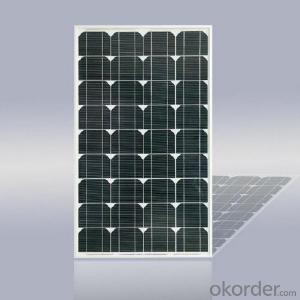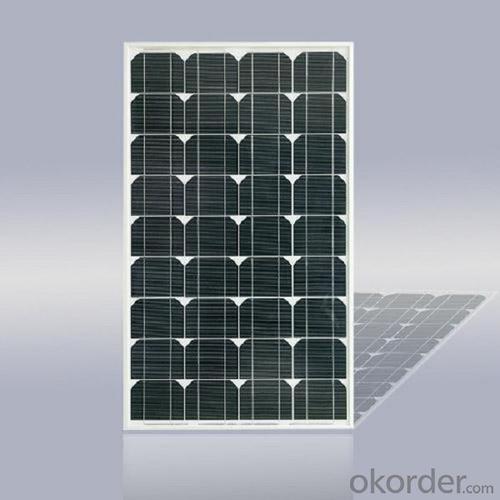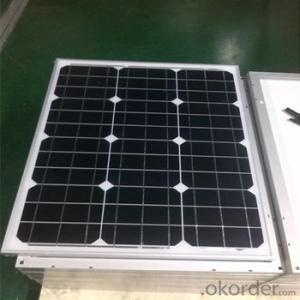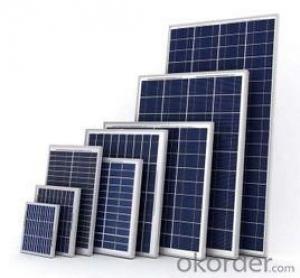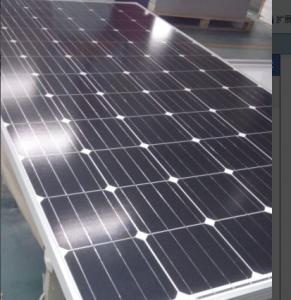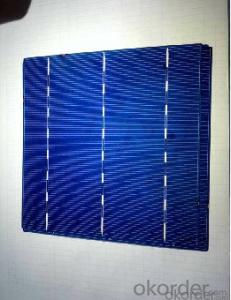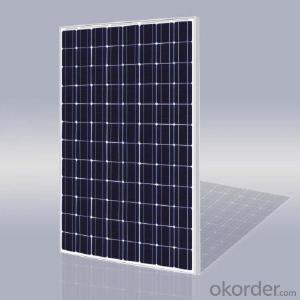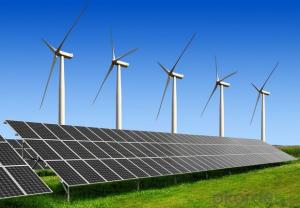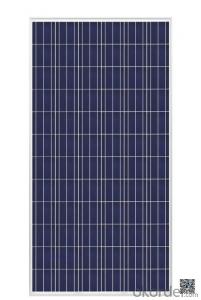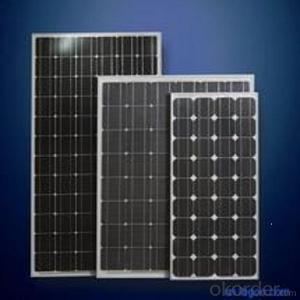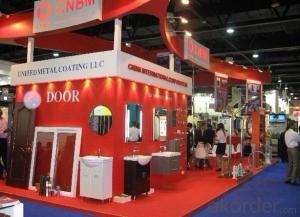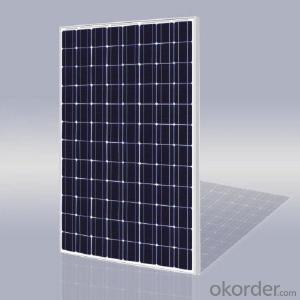Solar Panels Rhode Island - High Efficiency Solar Panel & Full Certificate Solar Module Panel
- Loading Port:
- Shanghai
- Payment Terms:
- TT OR LC
- Min Order Qty:
- 2600 watt
- Supply Capability:
- 26000 watt/month
OKorder Service Pledge
OKorder Financial Service
You Might Also Like
Specification
Product Description:
1.Structure of Solar Module Description
Solar panel refers either to a solar hot water panel, a common type of a solar thermal collector, or to one or more solar photovoltaics (PV) modules, electrically connected and mounted on a supporting structure.
A PV module is a packaged, connected assembly of typically 6×10 solar cells. Solar PV panels constitute the solar array of a photovoltaic systemthat generates and supplies solar electricity in commercial and residential applications. Each module is rated by its DC output power under standard test conditions, and typically ranges from 100 to 320 watts. The efficiency of a module determines the area of a module given the same rated output – an 8% efficient 230 watt module will have twice the area of a 16% efficient 230 watt module. There are a few solar panels available that are exceeding 19% efficiency. A single solar module can produce only a limited amount of power; most installations contain multiple modules. A photovoltaic system typically includes a panel or an array of solar modules, an inverter, and sometimes a battery and/or solar tracker and interconnection wiring.
2.Main Features of the Solar Module
1).High conversion efficiencies resulting in superior power output performance.
2).Outstanding power output even in low light or high temperature conditions
3).Optimized design for ease of soldering and lamination
4).Long-term stability,reliability and performance
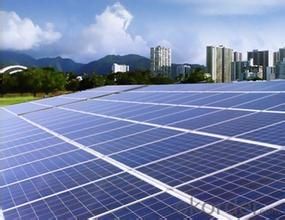
GENERAL SAFETY
1. Consult local codes and other applicable laws concerning required permits on regulations concerning installation and inspection requirements.
2. Before installation a PV module, contact appropriate authorities to determine permit, installation and inspection requirements that should be followed.
3. Install PV modules and ground frames in accordance with applicable rules and regulations
4. PV modules should be installed and maintained by qualified personnel. Only installer/service personnel should have access to the PV module installation site.
5. No matter where the PV modules are installed, either roof mounted construction or any other type of structures above the ground, appropriate safety practices should be followed and required safety equipment should be used in order to avoid possible safety hazards. Note that the installation of some PV modules on roofs may require the addition of fireproofing, depending on local building / fire codes.
6. Please use PV modules with same cell size within series.
7. Follow all safety precautions of other components used in the system.
8. In order to avoid a risk of injury or electrical shock, do not allow anyone to approach the PV module if the person has little knowledge on PV module or on the measures that should be taken when PV modules are damaged.
9. Do not clean the glass surface with chemicals. Do not let water stay on the glass surface of PV modules for a long time. This creates a risk of white efflorescence(glass disease) which may result in the deterioration of energy generation.
10. Do not clean the glass surface with chemicals. Do not let water stay on the glass surface of PV modules for a long time. This creates a risk of white efflorescence ( glass disease ) which may result in the deterioration of energy generation.
11. Do not install the PV module horizontally. It may cause dirt or white efflorescence (glass disease) due to water.
12. Do not cover the water drain holes of the frame. There is a risk of frost damage when the frame is filled with water copulation.
- Q: Hi. I need to build a solar panel for a project. it should be able to light a 60 watt light bulb. also, it should be about 3x3 ft if it is 50% efficient. if anyone knows any websites or can help me, please answer! thanks.
- I don't have any practical experience building solar panel arrays to power a given device, but allow me to make this observation. Solar cells, when exposed to sunlight, will each generate a given amount of power (watts), and by wiring these in series, you will increase the wattage. Now, a panel three feet square will give you a certain amount of power, provided all the cells are wired correctly in series, and it may not provide enough juice to light the bulb. You can work around this by adding a step-up transformer (which takes the incoming power and boosts it to the desired level for output, with no moving parts). Voila! You've illuminated your bulb. I will admit, though, you'll have to do some math to determine what you need. A search on the Web will help you find the formulae and other information you'll require. Good luck.
- Q: ) what is absolutely needed to hook up a solar panel to grid tie, what permits and/or inspectors are needed?2) if we know how many KWH's we use per month, do we just divide by number of hours per month to find out average KW usage?3) what is an estimated ratio of DC to AC transformation/convertion @ 30 C?4) do the solar panel voltages have to be the same? what would happen if the voltage going into the house is greater/lower than that of the house's defualt voltage5) for added chance of getting 0 pts add some contrators that do business in ohio for installing solar panels or sell them
- The okorder The reference section has all the formulas you are looking for and there is a list of dealers by state, plus various state rebate information. Yes, you can hook up different panels to the same system. There are special controllers that regulate the voltage. I'm more of a hands on nuts and bolts guy so I can't help you with the formulas and engineering explanations. Another great place to get information is Home Power Magazine. You can get the issues online or in print. Thanks for going solar!
- Q: I would like to know of any construction companies, road crews, or any company that uses solar panels in the Tampa area and throws them away. I like to recycle solar panels by repairing and processing what power I can from them. Know any companies that throw out used solar panels? If so, can you provide the name and number?
- Used solar panels are usually a great bargain. Unless there is obvious major damage, you are most likely making a very safe and thrifty purchase--and if you can test the panels with a multimeter in full sunlight before purchase, you are almost guaranteed a functional panel. Nobody really knows what the lifespan of a solar panel is, since many of the very first panels are still in operation. I have three very old Arcos on my house, and they are still performing well. However, used panel prices have
- Q: my dad met a guy representive for a solar panel company at a swapmeet Scam?
- Hard to say. Solar panels are becoming more common these days. May want to ask if the vendor is licensed and bonded contractor (if he's doing installation as well as panel sales). Find out the name of the equipment that this guy is selling (panels and other hardware) and do a search. For that matter, get the guys name and do a search on it to see he pops up elsewhere.
- Q: i am starting to consider getting solar panels instead of paying electric bills which are somewhat higher now than they used to be
- Budget okorder /
- Q: Hi. I hate the energy company. I hate my carbon footprint. I will likely move to a piece of property and put a decent-sized mobile home on it. I want solar panels so I can get my own power. I live in the state of Wisconsin. How much would this approximately cost? Would I need certain permits? How many panels can be used? Thanks for helping!
- I was in debt up to my eyeballs, and I needed help fast, so I looked to some free online programs. I had tried so many that were scams, but I finally found one legit one! In two months, I paid off $3000 of my debt.
- Q: Are solar panels suitable for all climates?
- Solar panels are suitable for most climates, but their efficiency may vary depending on factors such as sunlight intensity, temperature, and weather conditions. While solar panels can generate electricity in cloudy or colder regions, they are most efficient in areas with abundant sunlight and moderate temperatures. Advances in technology have made solar panels more adaptable to different climates, allowing for their effective use in various regions around the world.
- Q: Can solar panels be installed on warehouses or industrial facilities?
- Yes, solar panels can be installed on warehouses or industrial facilities. In fact, these large open spaces are often ideal for installing solar panels due to the ample roof space available. Installing solar panels on warehouses or industrial facilities can help generate clean and renewable energy, reduce electricity costs, and contribute to sustainability efforts.
- Q: How do solar panels affect the property's overall sustainability?
- Solar panels can significantly enhance a property's overall sustainability by harnessing renewable energy from the sun. They reduce dependence on fossil fuels, decrease carbon emissions, and contribute to energy independence. Additionally, solar panels can generate surplus electricity that can be sold back to the grid, further enhancing the property's sustainability and potentially providing financial benefits.
- Q: There is a charge controller that has what i believe to be only port for a solar/ wind turbine control panel and i don't know if it has more than port for panels. So would i be abed to link 2 panels to port or do you think the controller has more than portBTW it is for marine use.
- in case you positioned 'photograph voltaic international information' right into a seek engine, you will discover that there are a number of information that are being heavily contested. choosing up the reality from between hype is the activity. photograph voltaic panels generally have a rated optimal output of approximately one hundred ten watts consistent with squaremetre. yet relatively delivery to grids of kWh might element to a huge determination closer to fourteen watts / squareM. on a 24 hour foundation. Grid administration is for that reason careful approximately yield claims whilst history factors to in basic terms a million/8 of rated optimal output. there may be some irrelevant expectancies, whilst a photograph voltaic roof is first powering the construction, and in basic terms advertising extra to the grid.
Send your message to us
Solar Panels Rhode Island - High Efficiency Solar Panel & Full Certificate Solar Module Panel
- Loading Port:
- Shanghai
- Payment Terms:
- TT OR LC
- Min Order Qty:
- 2600 watt
- Supply Capability:
- 26000 watt/month
OKorder Service Pledge
OKorder Financial Service
Similar products
Hot products
Hot Searches
Related keywords
